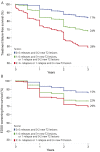Unraveling treatment response in multiple sclerosis: A clinical and MRI challenge
- PMID: 30587516
- PMCID: PMC6345120
- DOI: 10.1212/WNL.0000000000006810
Unraveling treatment response in multiple sclerosis: A clinical and MRI challenge
Abstract
Over the last few decades, the improved diagnostic criteria, the wide use of MRI, and the growing availability of effective pharmacologic treatments have led to substantial advances in the management of multiple sclerosis (MS). The importance of early diagnosis and treatment is now well-established, but there is still no consensus on how to define and monitor response to MS treatments. In particular, the clinical relevance of the detection of minimal MRI activity is controversial and recommendations on how to define and monitor treatment response are warranted. An expert panel of the Magnetic Resonance Imaging in MS Study Group analyzed and discussed published studies on treatment response in MS. The evolving concept of no evidence of disease activity and its effect on predicting long-term prognosis was examined, including the option of defining a more realistic target for daily clinical practice: minimal evidence of disease activity. Advantages and disadvantages associated with the use of MRI activity alone and quantitative scoring systems combining on-treatment clinical relapses and MRI active lesions to detect treatment response in the real-world setting were also discussed. While most published studies on this topic involved patients treated with interferon-β, special attention was given to more recent studies providing evidence based on treatment with other and more efficacious oral and injectable drugs. Finally, the panel identified future directions to pursue in this research field.
Copyright © 2018 American Academy of Neurology.
Figures



References
-
- Río J, Nos C, Tintoré M, et al. Defining the response to interferon-beta in relapsing-remitting multiple sclerosis patients. Ann Neurol 2006;59:344–352. - PubMed
-
- Bermel RA, You X, Foulds P, et al. Predictors of long-term outcome in multiple sclerosis patients treated with interferon β. Ann Neurol 2013;73:95–103. - PubMed
-
- Goodin DS, Traboulsee A, Knappertz V, et al. Relationship between early clinical characteristics and long term disability outcomes: 16 year cohort study (follow-up) of the pivotal interferon β-1b trial in multiple sclerosis. J Neurol Neurosurg Psychiatry 2012;83:282–287. - PubMed
-
- Tomassini V, Paolillo A, Russo P, et al. Predictors of long-term clinical response to interferon beta therapy in relapsing multiple sclerosis. J Neurol 2006;253:287–293. - PubMed
-
- Durelli L, Barbero P, Bergui M, et al. MRI activity and neutralising antibody as predictors of response to interferon beta treatment in multiple sclerosis. J Neurol Neurosurg Psychiatry 2008;79:646–651. - PubMed
Publication types
MeSH terms
LinkOut - more resources
Full Text Sources
Medical
